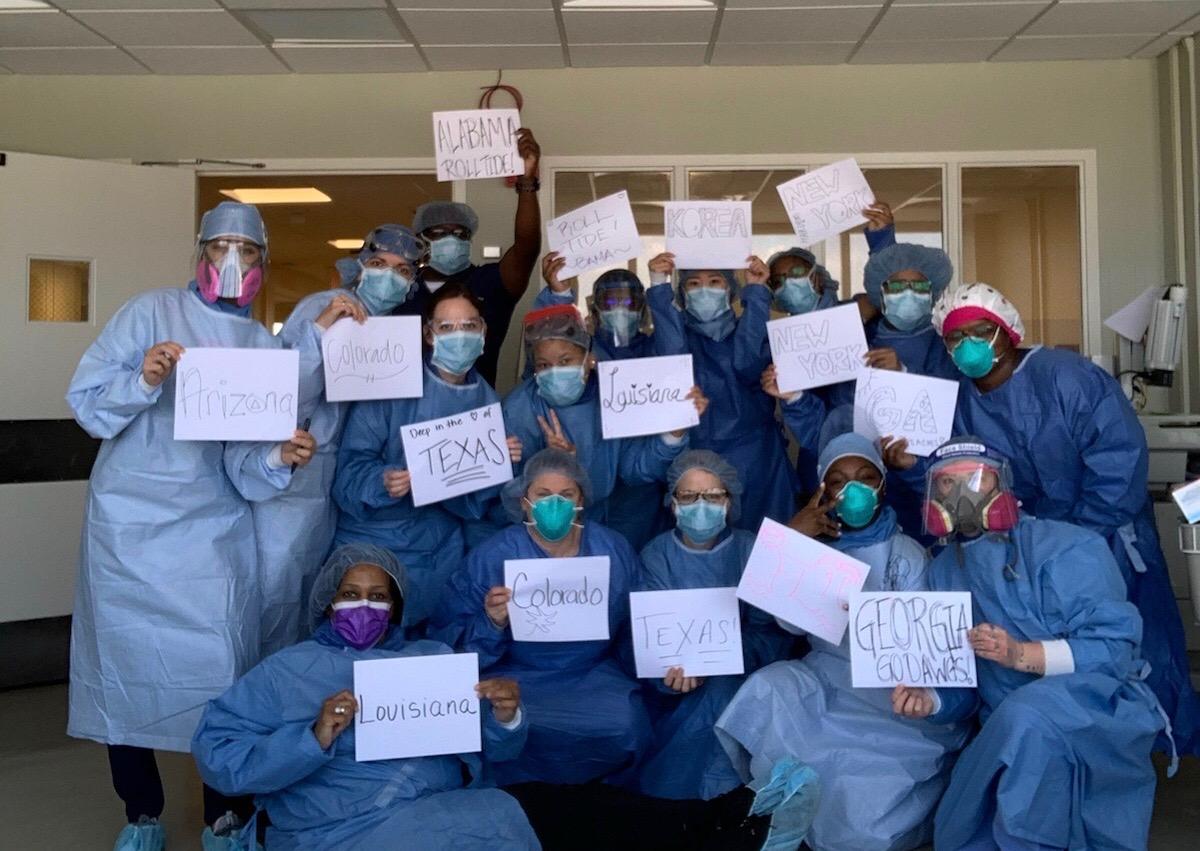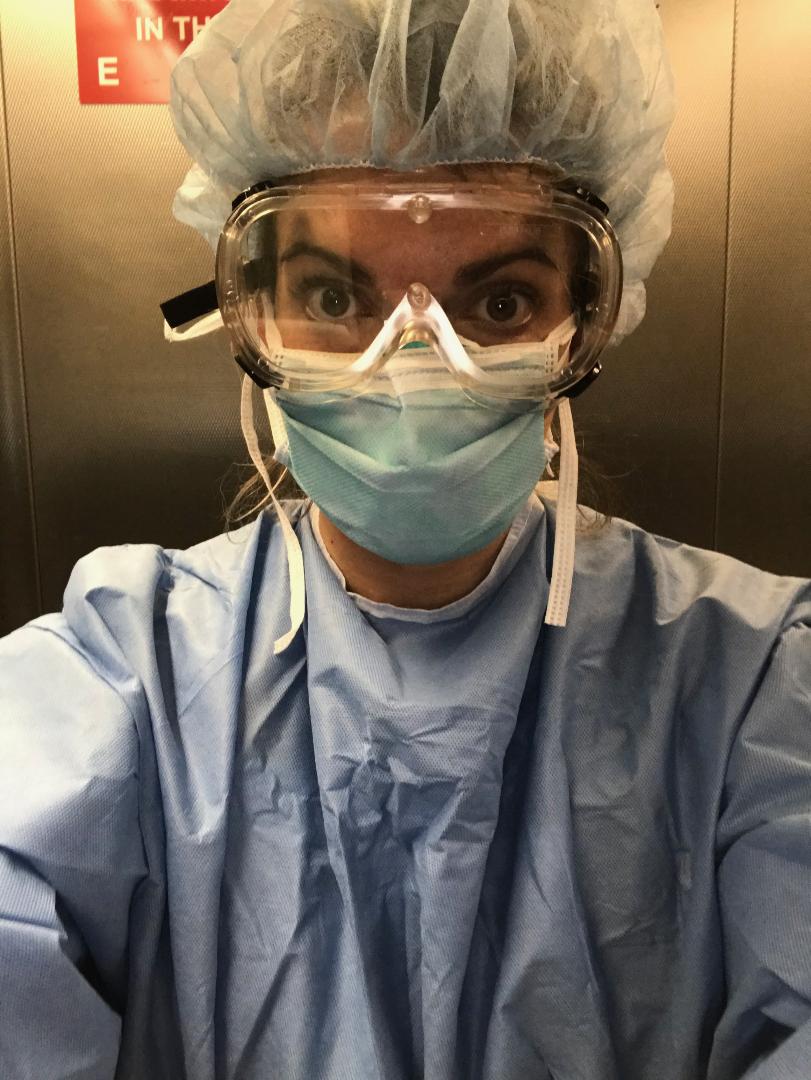- Jon Mark Beilue
- Nursing
Nursing Care in New York City
'Scared, dying alone' is hard to shake for WT graduate Mayo
By JON MARK BEILUE
Morgan Mayo was in New York in December, visiting a girlfriend who lived in New Jersey while taking in the sights and sounds of Christmas. There were the crowds at Times Square and Central Park, the holiday lights, the music, the famous tree at Rockefeller Center.
No inkling from anyone of what was to come, no idea that Mayo would return to New York almost four months later to something that seemed equal parts disaster movie and battlefield triage.
“Just seeing the patients there and their family can’t see them and they die alone. That’s the hardest thing for me,” Mayo said. “They’re scared and they die alone.”
Mayo, a native of New Deal, is from a West Texas A&M University family. Her parents, Ron and Kristi, are graduates. A brother and a sister attended WT. Morgan graduated from the WT School of Nursing in 2011.
*Photo: Morgan Mayo, a 2011 graduate of WT School of Nursing, is in the last week of four weeks as a temporary nurse at the Harlem Hospital Center in New York City, ground zero for the COVID-19 pandemic.
She is one of as many as eight nurses with WT degrees on the front lines in New York City, ground zero for the COVID-19 pandemic. New York state has more than 300,000 confirmed cases, nearly 30 percent of cases in the nation; more than 18,000 deaths have been attributed to the virus in the state. New York City alone has more than 172,000 positive cases.
“There’s no way you can prepare for some of these things,” Mayo said, “and when you get here, you just have to hit the ground running.”
Mayo is an infertility nurse in Denver after having previously worked in Austin since graduating from WT. Because she works in elective procedures, her hours were cut during a stay-at-home order in Denver.
A friend she had worked with in Austin reached out to her, encouraging her to apply as a temporary nurse in besieged New York City. Temporary nurses were to either add to the work force or replace some nurses who had contracted the disease.
The idea of using some unexpected free time in Denver to help on the front lines in New York intrigued to Mayo. She called some friends to get their thoughts. Her parents gave their blessings.
Mayo applied, got a call the next day that she was accepted and on April 11, the day before Easter, she was on a plane for New York. Mayo began work the day after Easter, and it’s been a blur since. This most definitely was not infertility care.
“There was anxiety leading up to it because I’m hearing different stories but I’m also getting prayers and support,” she said. “A friend here was able to work a couple of days before me and kind of let me know what to expect.
“I’m not used to this kind of nursing. But it’s kind of like riding a bike. You use the nursing skills you were taught and keep paddling.”
Making the best of a dire situation
Mayo was assigned to Harlem Hospital Center, a hospital particularly overwhelmed in a lower income section of New York. There were so many cases there that the 12th floor, previously empty, was opened for COVID-19 patients a few days before Mayo arrived.
There were multiple patients in rooms. They were patients in hallways. There were not enough medical machines, and most patients were exclusively on total nurse care.
“The hospital just wasn’t ready,” Mayo said, “but who can prepare for 250 more patients than a hospital can handle? We try to make work with what we have. Often, we didn’t have the correct (Personal Protective Equipment) or enough. I’ve always had enough PPE, but this was not always the case. It’s just the basics to keep patients alive.”
In the arduous days after Easter, there was little escape from the emotional and physical toll. Two weeks after arriving, it’s still a good day if a patient does not die on one of her shifts. The swift and sudden attack of COVID-19 is what makes this virus so different.
“They can take a turn really quickly,” Mayo said. “A patient can be walking and talking on oxygen, and a couple of hours later, they’re unresponsive and have passed away. That’s the hardest thing. They go critical really fast, and they pass away without families.”
Mayo is part of a group of temporary nurses who have been accepted across the country. They are transported back and forth via van from their hotel to Harlem Hospital. Mayo and other nurses arrive around 6:30 a.m. and don’t leave until 8:30 p.m. The 14-hour shifts are broken up by a 30-minute break. It’s six days on and one day off.
“By the time you get to your room, shower, get something to eat, it’s time to go to bed and you repeat it all over again,” she said. “It’s been mentally and physical exhausting. You don’t have time to process everything.”
In Suffolk County in neighboring Long Island, “hundreds” of nurses have tested positive, according to WABC in New York, and two have died. A 32-year-old nurse in the city died since Mayo began work.
“I’ve been asked if I’m scared,” she said, “and I haven’t been scared for myself personally. I feel God’s protective hand, and I also just don’t have time to think about it.”
The feeling is for New York, for the nation, for Mayo that the worst may be over. The curve has flattened. The first patient under her care was discharged April 25. The nurse-to-patient ratio is improving. When she first began work, she had eight to 12 patients under her care. Now, it’s three to four.
*Photo: Morgan Mayo, second from left, second row, is one of the more than a dozen across the country who applied to work as a temporary nurse and was assigned to the Harlem Hospital.
“If there’s a silver lining, it’s that,” she said. “But even with three patients, my first break the other day was around 3 p.m. It’s still crazy, but it’s definitely getting better which is a blessing.”
Mayo’s four weeks ends May 10; she will have worked 13 out of 14 days. She can sign on for more time, but the 84 hours a week for nearly a month is enough. She will then be tested and self-quarantined for 14 days.
Through this, Mayo has felt support through her WT past. A sorority sister of her mother, whom she has never met, mailed her a care package. Other alumni have reached out to say they’re praying for her and asking if they can help in another way.
“That part has been really cool,” Mayo said. “It would have been different had I gone to a really big college.”
These graduates from the West Texas A&M School of Nursing are also reportedly working in the New York City area during the COVID-19 pandemic:
Monica Hamilton Blucher
Amy Dowse
Cynthia Garcia
Taylor Freeland Hutcheson
Alex Inkhamheng
Marcus Marquez
Pedro Serrano
Michelle Tarango
Seve Witt Stowers
Do you know of a student, faculty member, project, an alumnus or any other story idea for “WT: The Heart and Soul of the Texas Panhandle?” If so, email Jon Mark Beilue at jbeilue@wtamu.edu.
—WTAMU—


